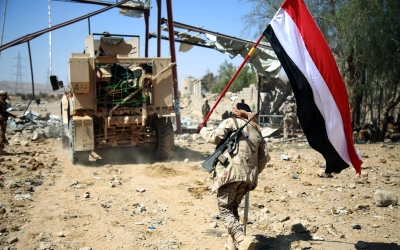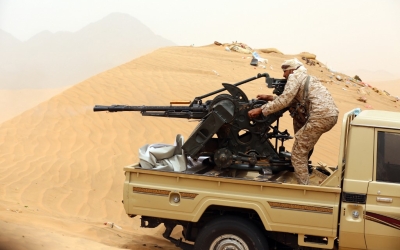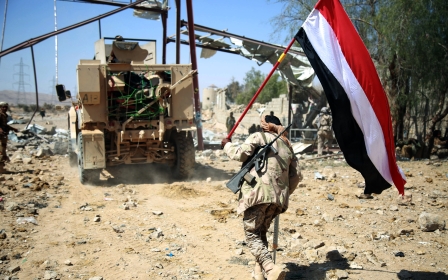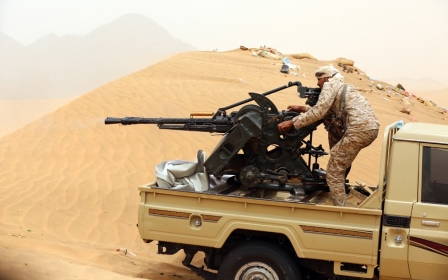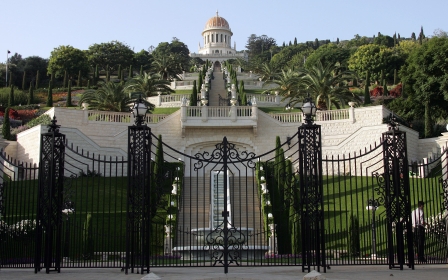In dramatic counterattack, Houthis take Yemen's Al-Jawf and eye Marib

It was supposed to end very differently. In January forces loyal to Yemen President Abd Rabbuh Mansour Hadi promised to advance from their base in Nehm to the capital Sanaa, threatening the centre of power of the rebel Houthis.
Yet instead of making advances, the opposite happened. The battles in Nehm district - which lies 60km to the northeast of Sanaa - and in the provinces of Marib and Al-Jawf, saw the rebels confront the advance and launch huge counter-attacks, which captured the whole of Nehm and large parts of Marib.
The Houthis also launched a major assault on Al-Jawf province, one of the strongest pro-Hadi provinces, where tribal fighters have previously engaged in battles against the Houthis.
Amid the ongoing fighting, the Houthis have been gradually advancing in Al-Jawf and on Sunday took over Al-Hazm district, the capital of the province.
A Houthi source in Sanaa told Middle East Eye: “Al-Jawf is one of the most important provinces for us as there are some loyal tribal leaders there who asked us to liberate the province and our forces were brave enough to do so.”
Speaking on condition of anonymity, because he was not authorised to speak ahead of a statement from the Houthi's military spokesperson, he said: “We took over the whole province of Al-Jawf, and Marib is our next target."
He added that some sheikhs in Al-Jawf province had led mediation efforts and supported the Houthis in taking over the province. The source said that Marib governor, Sultan al-Aradah, should follow suit to avoid further bloodshed.
“We hope that Aradah understands the lesson and hands over Marib peacefully,” he said.
Sheikh Amin al-Okaimi, the governor of Al-Jawf, led the battles against the Houthis and two of his sons were killed over the last month, one of them on Sunday.
The battles are ongoing in Marib while the Houthis are chasing the remnants of the pro-Hadi forces in Al-Jawf.
Betrayal
Some pro-Hadi officials consider the Houthis advance in Al-Jawf to be a betrayal by the Saudi-led coalition and officials outside of the country.
Professor Mohamed Jumeh, the ambassador and permanent representative of Yemen to Unesco, tweeted: “The fall of Al-Jawf’s capital Al-Hazm in the hands of the Houthis is a natural reflection to the presence of the political and military leaders outside the homeland.”
He also said that there are thousands of fake soldiers in the Yemeni army, stating that Al-Jawf was betrayed, while its citizens fought bravely. He did not name who betrayed Al-Jawf.
'For me, I do not care who controls Al-Jawf or the whole of Yemen, but I hope that all Yemen enjoys peace and hope to see that soon'
- Ahmed, Al-Jawf resident in Sanaa
Anes Mansour, consulting journalist for the Yemeni embassy in Riyadh and chairman of the Aden Centre for Studies, confirmed that Okaimi, the governor of Al-Jawf, had been besieged by the Houthis in his house but that mediation efforts had helped him get away.
“A mediation led by the brother of Al-Okaimi, Sheikh Rabie, intervened and ensured a safe exit and departure for Al-Okaimi,” Mansour tweeted.
He said that he had contacted Okaimi’s brother himself and told him about his sibling, confirming that the mediation was with pro-Houthi leaders and with the office of the Houthi's leader.
“Al-Okaimi is in a safe place with some of his family members. His house and some neighbouring houses were targeted by the Saudi-led coalition,” Mansour said.
'Playing with the souls of the tribes'
Some Yemeni journalists and activists say that the Houthis decide when the battles begin and end, while the pro-Hadi forces are just there to try to defend themselves when possible.
The pro-Hadi journalist Baeem Al-Jenani tweeted: “The Houthi is the controller of the battles. Houthis open the fighting when they want and they decide when to stop.
“The role of the other side [pro-Hadi forces] was changed into defending and confronting and finally ends up with defeat, refraction or withdrawal.”
Ahmed,* a resident of Al-Jawf who lives in Sanaa, confirmed that what happened in Al-Jawf was “a betrayal by the government,” adding that Al-Jawf’s tribes lost many fighters in the recent battles.
“The tribal fighters have been fighting fiercely in Al-Jawf as they are the people of the land and they protect their areas from the Houthis, but the soldiers withdrew and they left the tribal fighters alone,” he told MEE.
“Hundreds were killed and injured in these battles, and many fled their houses, leaving everything behind them and the main reason was the betrayal of the so-called army.”
Ahmed accused the Yemeni government and its army of “playing with the souls of the tribes,” adding that the tribal fighters may not believe the Hadi government's promises in the future.
“In the last resort, a mediation from some sheikhs in Al-Jawf intervened and agreed with the Houthi leaders in Al-Jawf not to fight them in return for allowing civilians to leave their houses.”
Ahmed, who works in a car workshop in Sanaa, believes that the Houthis have attracted new supporters in Al-Jawf after the recent battles and they may use those newly recruited fighters to attack Marib.
“For me, I do not care who controls Al-Jawf or the whole of Yemen, but I hope that all Yemen enjoys peace and hope to see that soon,” Ahmed said.
“If the governors can reach a reconciliation with the Houthis, that is better than fighting.”
Ahmad believes that the fiercest fighters are in Al-Jawf and it will be easy for the Houthis to take over Marib, which is surrounded by the Houthis.
'Mediation killed the spirit of the fighters'
The pro-Hadi fighters who withdrew from Al-Jawf to Marib are now planning how to defend Marib from the Houthis who are near to the city and can attack it from different directions.
Wael,* a pro-Hadi soldier who first fought with the pro-government forces in Nehm and then in Al-Jawf, told MEE: “We had been fighting the Houthis since January in Al-Jawf and they could not take it over.
“On Saturday, our leadership directed us to withdraw from Al-Ghail district to Al-Hazm and we did and yesterday (Sunday) we could not confront the Houthis so they took over the last area in Al-Jawf.”
Wael confirmed that the withdrawal of the forces from Al-Ghail was the first step towards defeat as the soldiers did not fight fiercely in Al-Hazm and they expected new directions of withdrawal.
“After our defeat in Al-Jawf, we heard that there was a mediation with the Houthis to take over Al-Jawf and really that mediation killed the spirit of the fighters,” he said.
Middle East Eye delivers independent and unrivalled coverage and analysis of the Middle East, North Africa and beyond. To learn more about republishing this content and the associated fees, please fill out this form. More about MEE can be found here.


